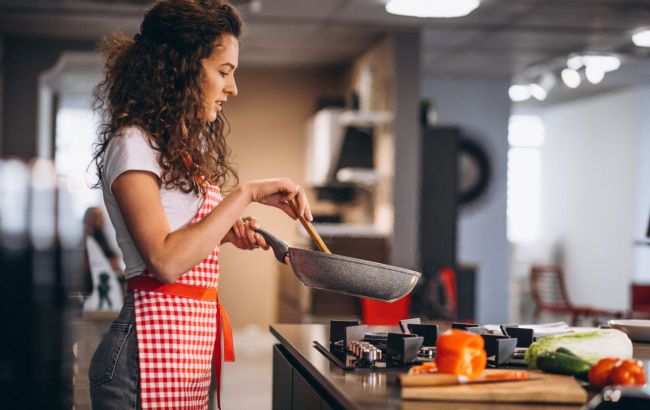Even healthy ingredients turn harmful: Beware of cookware restrictions
 What dishes should not be used (photo: Freepik)
What dishes should not be used (photo: Freepik)
The nutritional value of food depends not only on how it's prepared but also on the quality of cookware. Some kitchenware materials can negatively impact health as they release harmful substances when heated. The coach Yuriy Popko on Instagram shares insights on what cookware is suitable or unsuitable for cooking.
Cookware made from which materials should not be used
"We're talking today about the cookware we use for cooking because even the healthiest products can become harmful if the wrong cookware is used," says the expert.
Popko advises getting rid of aluminum cookware and foil, as they are not suitable for cooking.
"Aluminum is a heavy metal that, when heated, leaches into food and is challenging to eliminate from the body, negatively affecting health. Aluminum baking forms can be used, but only if lined with parchment paper," says the coach.
According to Popko, Teflon cookware should also be avoided. Under certain conditions, it can lead to the formation of malignant tumors.
"And the worst part is that harmful substances are released during cooking in such cookware, which are then difficult to eliminate from the body. This includes perfluorooctanoic acid used in Teflon production, as well as benzene released when non-stick coatings are heated above 220 degrees," warns the expert.
Copper cookware is also unsuitable because it oxidizes. It's also advisable to get rid of melamine cookware because this material is dangerous when heated above 70 degrees.
"You can use silicone cookware if it is of high quality and not heated to more than 150 degrees. It should not smell like rubber and should not be brightly colored," says Popko.
What cookware can be used
"Stainless steel cookware is excellent for cooking, but look for those marked 18/10, 18/8, and ideally 18/0. The first number indicates the percentage of chromium, and the second is nickel. The less nickel, the better. It's also important that the cookware is labeled 'surgical steel'," advises the expert.
However, he emphasizes that it's not advisable to store food in stainless steel cookware for an extended period because it can oxidize the products. Food should be stored in glass or ceramic pots.
"Ceramic cookware and heat-resistant glass are suitable for baking. Enamel-coated cookware can also be used, but once it develops rust or chips, it should be discarded," says Popko.
Cast iron cookware and BPA-free plastic can be used for storage.
The expert recommends choosing cookware in light colors, as bright colors often involve the use of dyes containing heavy metals.
Previously, we wrote about which products destroy bones.
This material is for informational purposes only and should not be used for medical diagnosis or self-treatment. Our goal is to provide readers with accurate information about symptoms, causes, and methods of detecting diseases. RBС-Ukraine is not responsible for any diagnoses that readers may make based on materials from the resource. We do not recommend self-treatment and advise consulting a doctor in case of any health concerns.

